In my opinion, the best brisket rub for bark is:
- 1/4 cup Diamond Crystal Kosher Salt
- 2 tbsp 16 mesh black pepper (pre-cracked)
- 2 tbsp freshly cracked black peppercorns
- 1 tbsp granulated garlic
- 2 tsp celery salt
All the above is per side.
Note: This is for a 10-12 lb brisket, trimmed. If your brisket is smaller, you’ll need less. Chances are if you can still see lean meat or fat and not pepper, you’ve used enough rub.
Update 6/13/2025: Updated to what I’ve been using for past year or so.
If you just need a rub you can buy, my personal favorite commercial option is Steve Gow’s from Smoke Trails BBQ.
Pepper is the Single Most Important Ingredient for Improving Brisket Bark
The main things to understand are “mesh” sizes and the effect of freshly cracked peppercorns vs ground pepper.
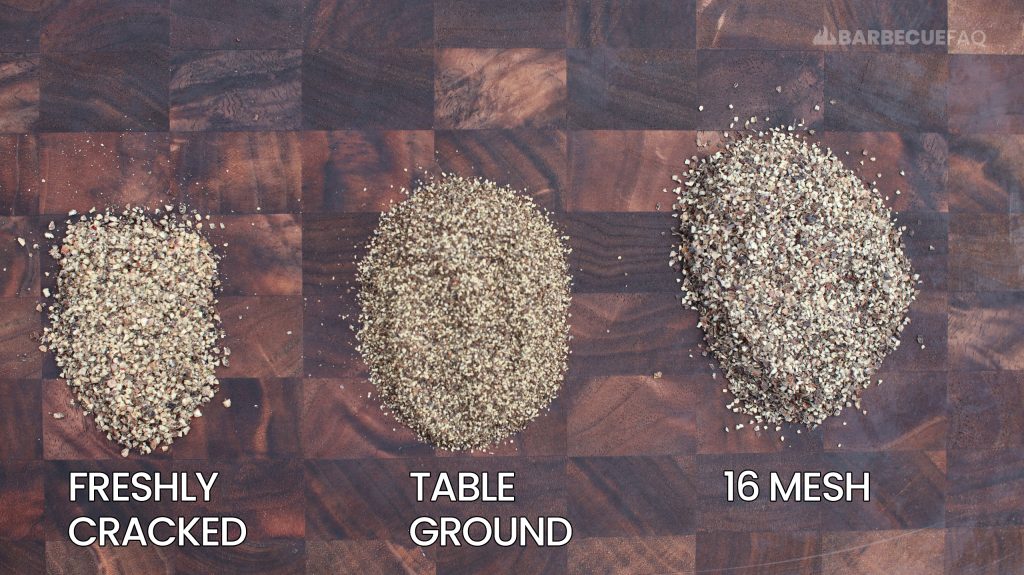
Pepper Mesh Size
After following enough brisket articles or watching enough brisket recipe videos, you’ll hear the person mention the word “mesh.”
The term mesh simply refers to the coarseness of ground pepper.
To illustrate various mesh sizes of pepper:
- Whole black pepper – 6 to 8 mesh
- Quarter cracked black pepper – 8 to 10 mesh
- Coarse black pepper – 12 to 14 mesh
- Table ground black pepper – 18 to 28 mesh
- Fine ground black pepper – 30 to 34 mesh
The most commonly referenced “mesh” size for brisket is 16 mesh black pepper.
Based on the above list, it’s somewhere between coarse and table ground.
Freshly Cracked Peppercorns vs Pre-ground Pepper
Something that I wanted to harp on is that there is a huge difference between freshly cracked peppercorns and pre-ground, 16 mesh black pepper.
To start, they don’t taste the same.
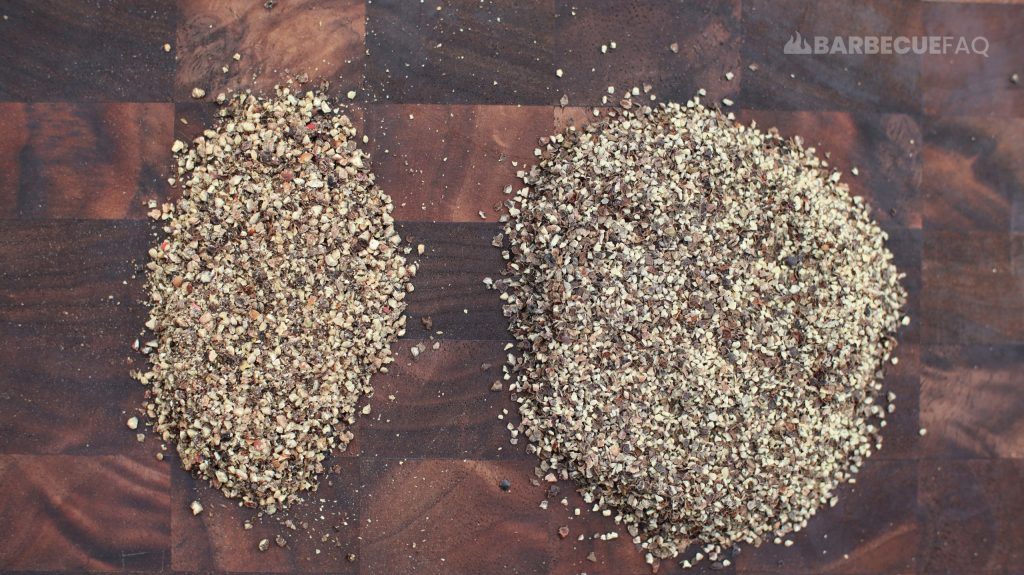
The flavor from both forms comes from compounds like:
- Piperine – Alkaloid responsible for the pungency of black pepper.
- Terpenes – Compounds responsible for the way most plants smell.
Freshly cracked peppercorn has less surface area so these compounds don’t evaporate as quickly. Conversely, something like 16 mesh has a greater surface area meaning a higher rate of evaporation.
Put simply, freshly cracked peppercorns are stronger or more pungent than 16 mesh black pepper.
The only reason I bring this up is because if your recipe calls for an excessive amount of 16 mesh black pepper, I wholeheartedly advise against substituting the same amount of freshly cracked black peppercorns.
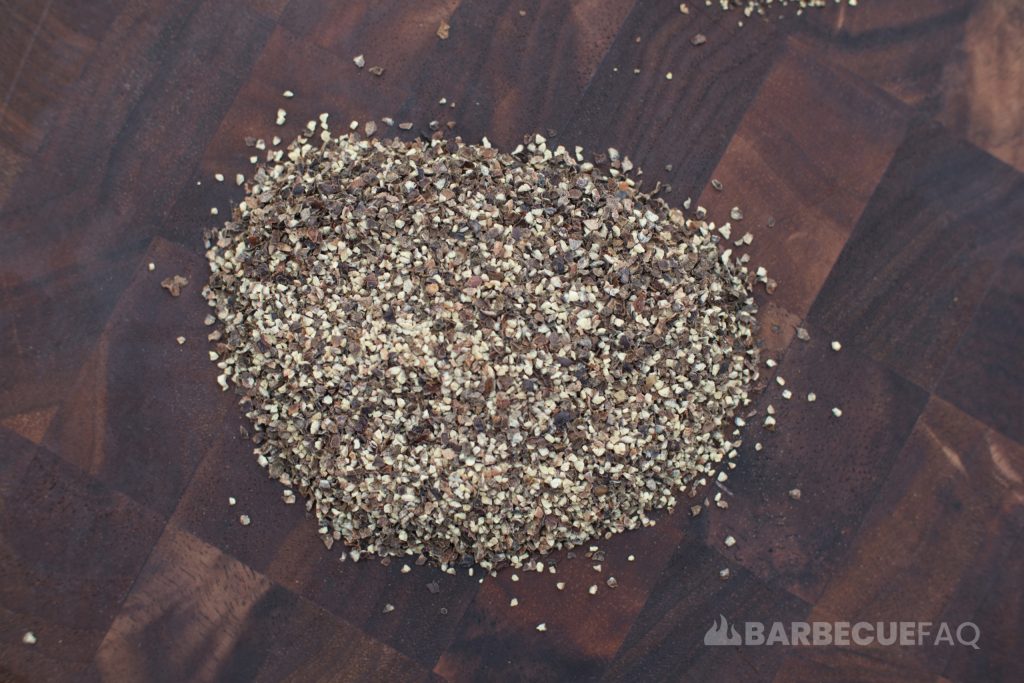
I personally love freshly cracked peppercorns – while you can’t use nearly the same amount as you can with 16 mesh, it adds a quick pop of pungency in your bite.
With freshly cracked peppercorns, you need maybe 1-2 tablespoons for both sides of a 7-12 lb brisket.
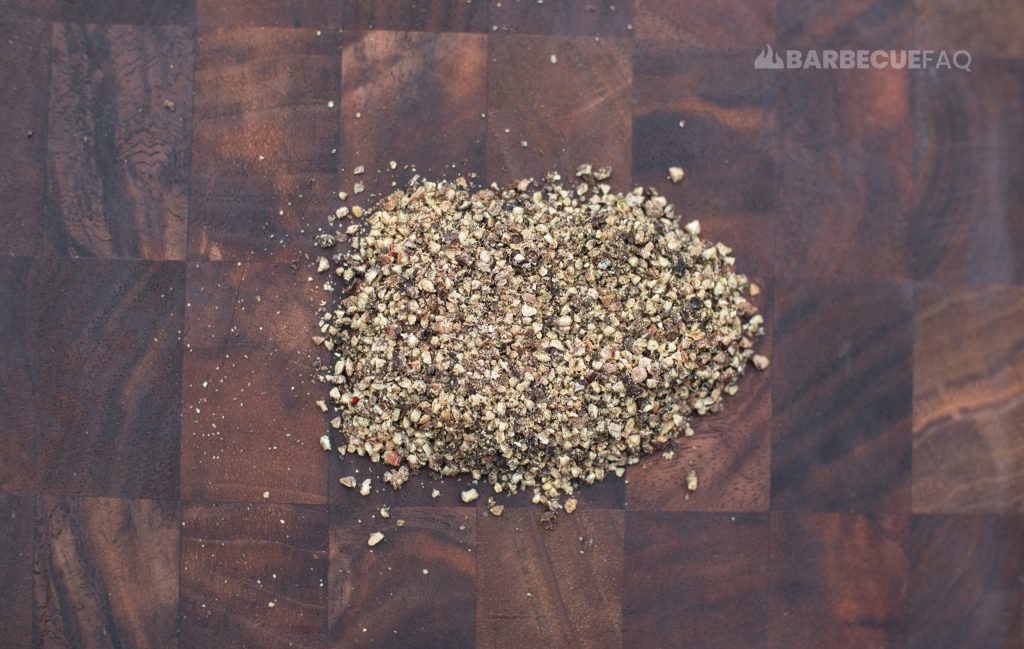
Where-as with 16 mesh black pepper you can be super aggressive; The result is an almost “crunchy” exterior that gets formed.
This combined with the pellicle on the surface of the meat creates a different mouth-feel that’s pleasurable.
Maybe a better option would be a mixture of both 16 mesh for the crunchy bark and a tablespoon of freshly cracked peppercorns for a pop of flavor?
I’ll report back with my findings!This is great and now what I do – I use a 50/50 mix.
Salt is a Flavor Enhancer But…
The main thing to talk about in terms of salt is the type of salt you’re using (table vs kosher salt) and the brand.
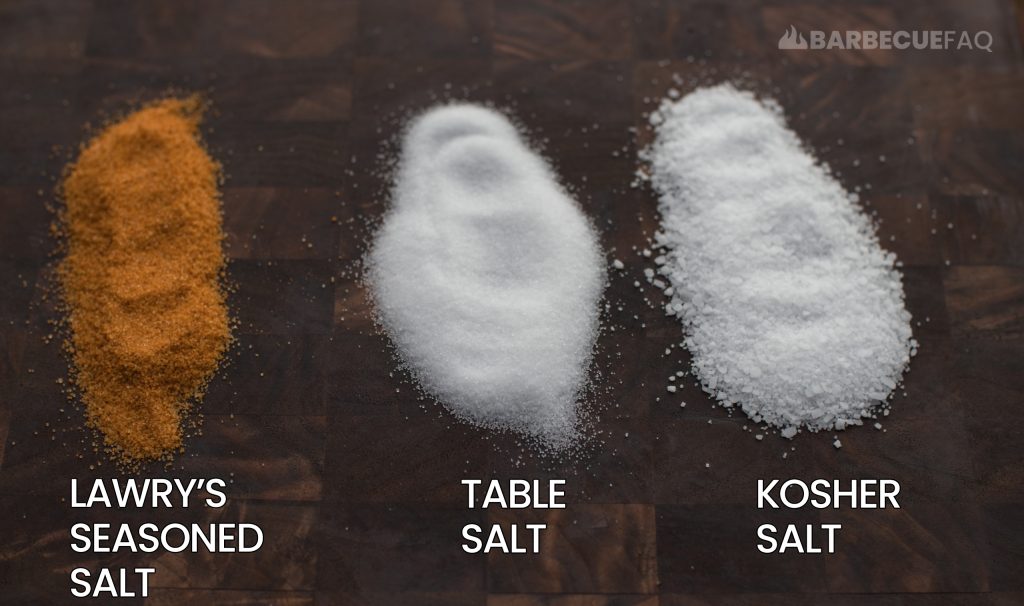
Morton’s Kosher Salt vs Diamond Crystal Kosher Salt
In the barbecue community literally every single concept is an argument.
Elitist’s will say to use Diamond Crystal Kosher Salt because it features a singular ingredient – kosher salt.
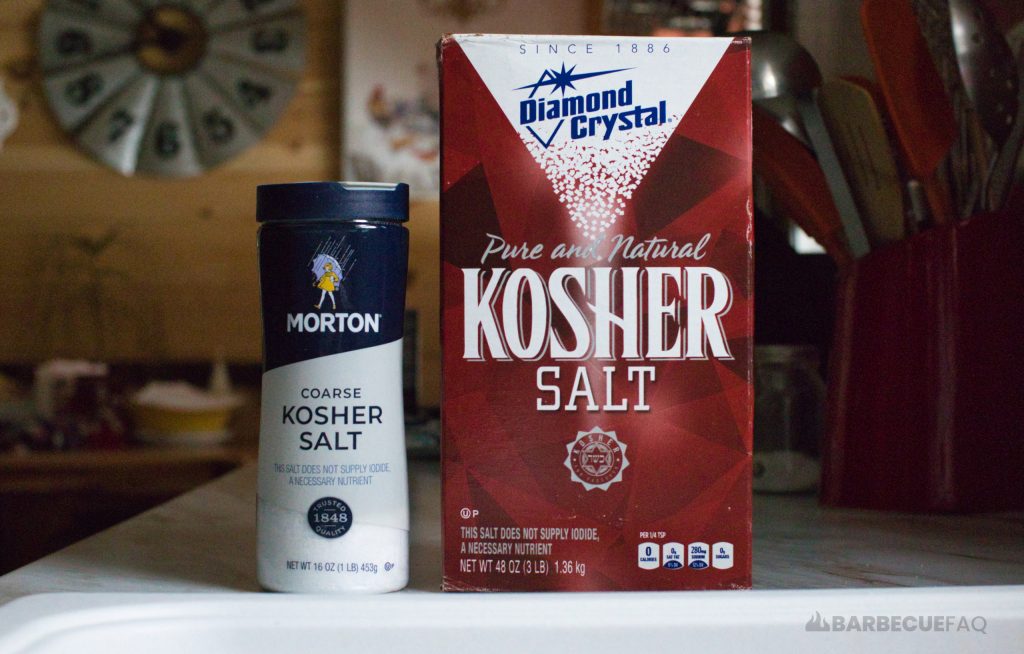
Here’s Diamond Crystal Kosher salt:

Here’s Morton Kosher Salt:
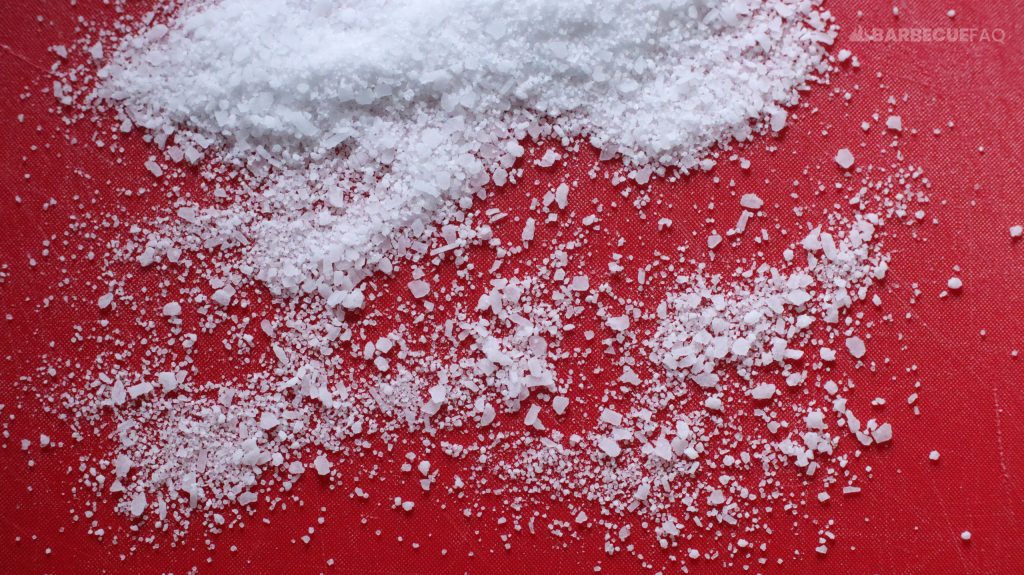
The reason people don’t like using Morton’s is because it features an anti-caking agent (yellow prussiate of soda, or sodium ferrocyanide).
Where-as Diamond Crystal is just kosher salt.
In my humble opinion, for a person who does backyard barbecue, this doesn’t matter; You aren’t going to taste a difference.
However, something that does matter is knowing how the brands can affect the “saltiness” of your food.
In my recipes I specify the salt I use as apposed to just “kosher salt.” If in a recipe for brisket you see someone use a significant amount of Diamond Crystal, you cannot substitute equal parts Morton’s.
This is because Morton’s is twice as dense as Diamond Crystal.
- Morton’s Kosher Salt: 1.075g/mL
- Diamond Crystal Kosher Salt: 0.514g/mL
So if the recipe says to use 2 tbsp of Diamond crystal, you’d only use 1 tbsp of Morton’s.
Table Salt vs Kosher Salt
This sort of begs the question – what about regular table salt?
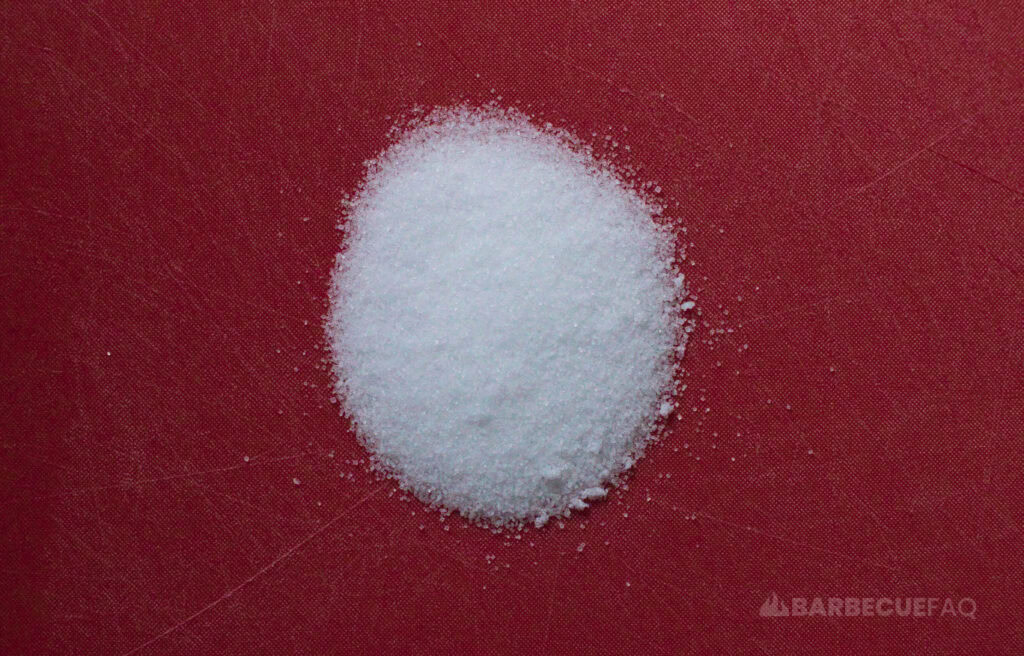
The reason I brought up the brands first is because it helps to transition into the reason why table salt is problematic:
Table salt is even more dense than Morton’s.
- Morton’s Kosher Salt: 1.075g/mL
- Morton’s Table Salt: 1.21g/mL
There is also the fact that the grain size of kosher salt and table salt are much different; It’s in a similar vein to pepper mesh sizes.
Kosher salt is coarse where-as table salt is fine.
The coarse grains will salt your food in a way that enhances the flavor of the food; Table salt will simply make the food taste “salty.”
There’s also the concept of iodized vs non-iodized salt. Morton’s and Diamond Crystal kosher salt aren’t iodized where-as some table salts are. Some folks find that iodized salt has a bitter after-taste.
Other Ingredients
Truly, all that’s needed to make a good brisket is Kosher Salt and Pepper. Aside from those 2 ingredients it comes down to personal taste preferences.
Other Ingredients I quite like with brisket are:
- Garlic powder
- Onion powder
- Lawry’s Seasoned salt – which is actually a combination of ingredients.
- Celery salt
- Cured Sumac
Typically I’ll just stick to Morton’s Kosher Salt, Freshly cracked peppercorns, and garlic powder.
Lawry’s seasoned salt has become super popular in the Barbecue community because of Johnny White from Goldee’s Barbecue – which was recently voted as the number 1 barbecue joint in Texas by Texas Monthly.
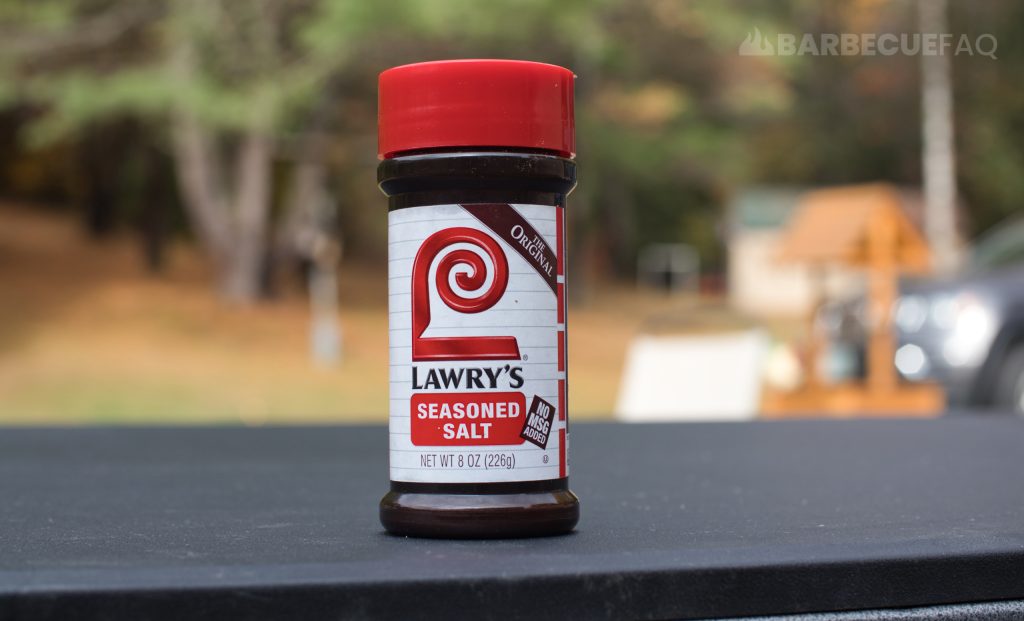
Johnny White used to work for Franklin Barbecue which is world renowned for their brisket and Aaron Franklin is someone who has harped on just using “salt and pepper.”
You can sort of read between the lines in the next part here.
Barbecue has long been something people have been secretive about and that even includes things like rub ingredients.
Recently though, when Aaron was asked about Lawry’s he actually admitted that they’ve used it.
With that said, I think Aaron’s comment – “you don’t have to have a complicated rub to make great barbecue” is true.
Something as simple as Kosher salt and Pepper make wonderful bark on a brisket.
The use of other spices is simply personal preference.


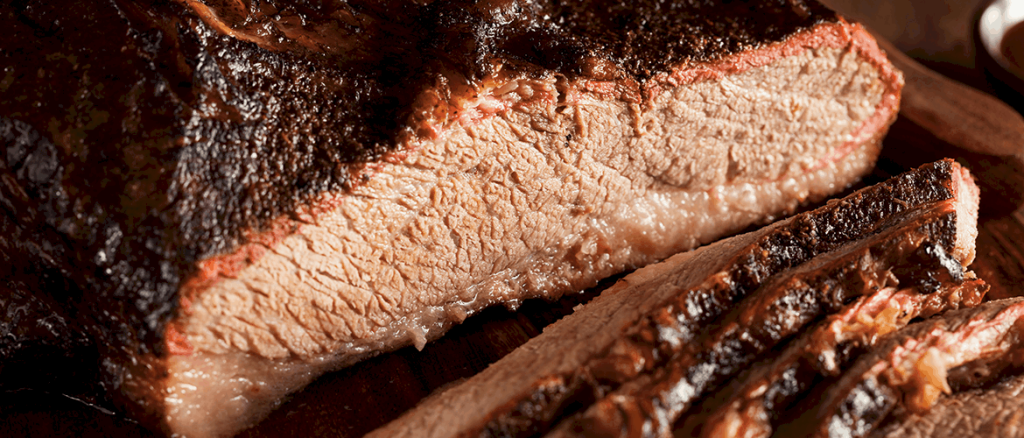

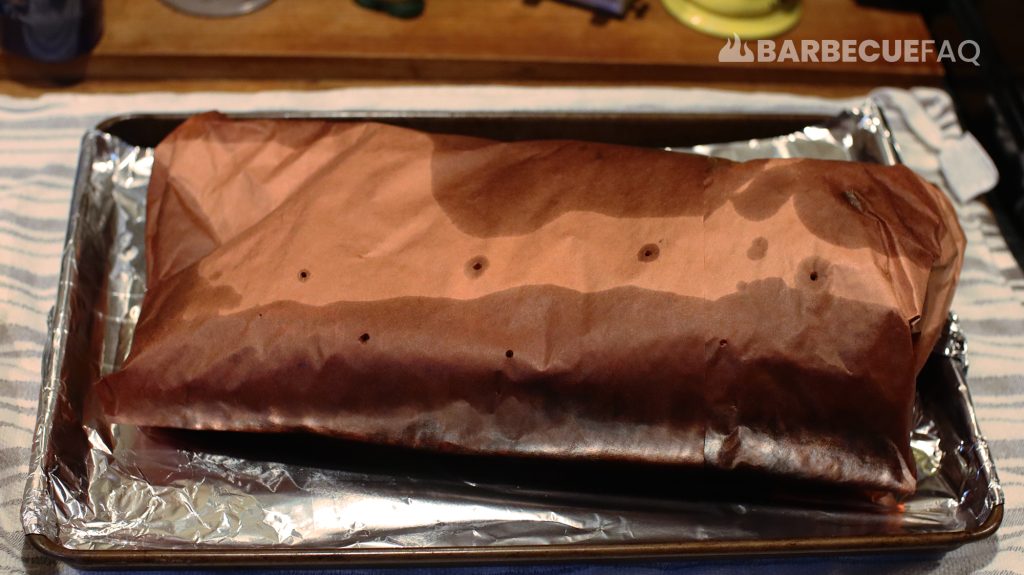
10 comments
Thomas Rabbe
Great info filled in a lot of blanks thank you
Dylan Clay
Happy to help Thomas.
-Dylan
Nathan. S
Thank you for this information. Being new to smoking brisket this helps alot!
Dylan Clay
Happy to help Nathan!
Brian Thibodeaux
I enjoyed your article,I never knew about the mesh. I like to read different articles before I cook just to make sure I don’t miss anything in my recipe or find out something new. Most articles I read halfway through them you realize they really don’t know…. You know!
Dylan Clay
Happy to help Brian; Readers like you are the reason I made Barbecue FAQ.
Road Dog
Great article. Very informative.
Dylan Clay
Happy to help Road Dog!
S. Mark Brown
Thanks, great article
Dylan Clay
Appreciate the comment S. Mark Brown!